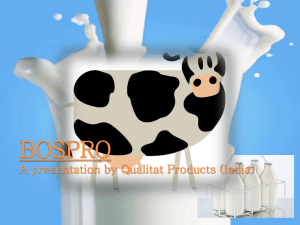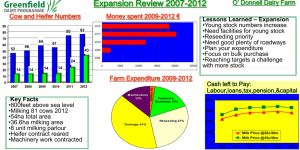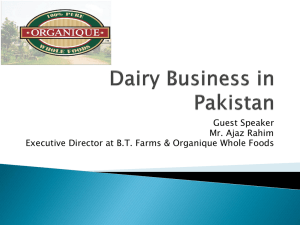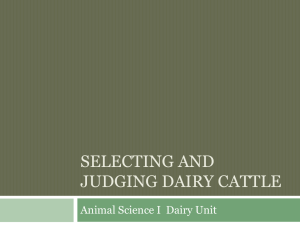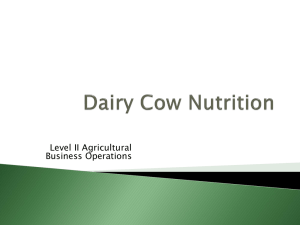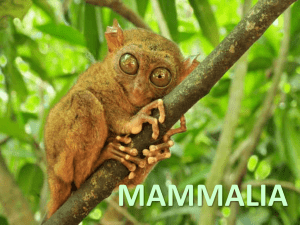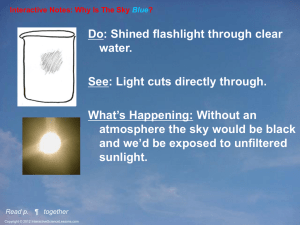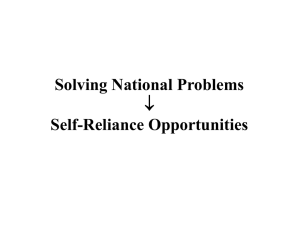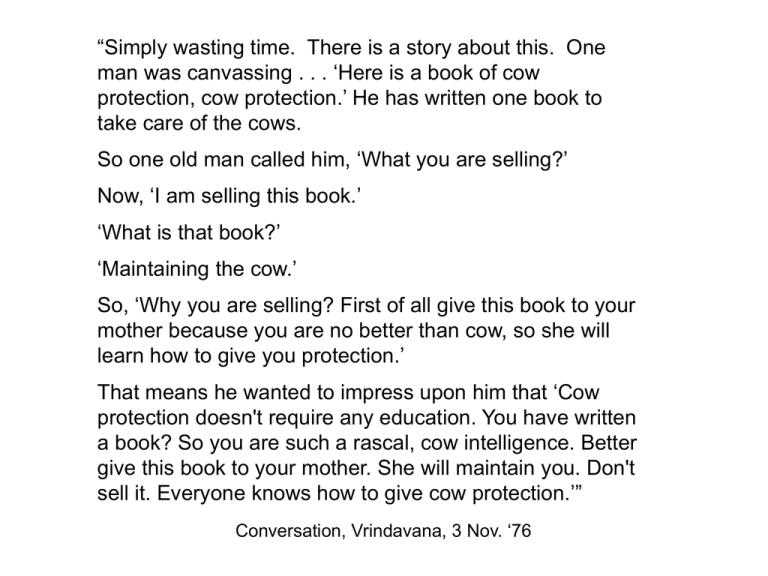
“Simply wasting time. There is a story about this. One
man was canvassing . . . ‘Here is a book of cow
protection, cow protection.’ He has written one book to
take care of the cows.
So one old man called him, ‘What you are selling?’
Now, ‘I am selling this book.’
‘What is that book?’
‘Maintaining the cow.’
So, ‘Why you are selling? First of all give this book to your
mother because you are no better than cow, so she will
learn how to give you protection.’
That means he wanted to impress upon him that ‘Cow
protection doesn't require any education. You have written
a book? So you are such a rascal, cow intelligence. Better
give this book to your mother. She will maintain you. Don't
sell it. Everyone knows how to give cow protection.’”
Conversation, Vrindavana, 3 Nov. ‘76
Liquid Dharma
Srila Prabhupada’s Vision of Cow Protection and
Dairy Consumption Within ISKCON
Tukarama Dasa
President, ISKCON Laguna Beach
Navina-Syama Dasa
Chairman, ECO-Vrindaban
Is milk important?
namo brahmaṇya-devāya
go-brāhmaṇa-hitāya ca
jagad-dhitāya kṛṣṇāya
govindāya namo namaḥ
Viṣṇu Purāṇa, 1.19.65
Cow Protection
“This Krishna consciousness
movement is for the protection of
brahminical culture and cows.”
Lecture, Los Angeles, 4 Dec. ’68
Cow Protection
“Lord Krishna is never satisfied when
these are lacking.”
S.B. 1.8.21 purport
Cow Protection
“When these two things are neglected,
it is animal society, and then other
animal qualities and paraphernalia
follow.”
Lecture, London, 13 Sept. ’69
Morning Walk, Mayapura, 6 Apr. ‘75
Lecture, Vrindavana, 10 Nov. ‘76
Cow Protection
“In fact, comfort for the brahmanas is
secondary, and comfort for the cows is
His first concern.”
S.B. 10.8.16 purport
Cow Protection
“The protection of cows . . . is not
merely a religious sentiment but a
means to secure the highest benefit
for human society.”
Light of the Bhagavata 27 purport
Lecture, New York, 7 Apr. ’73
Cow Protection
“the most important business of the
human society ”
Lecture, Los Angeles, 4 Dec. ’68
Lecture, New York, 28 Mar. ’66
Lecture, Los Angeles, 5 May ’73
Lecture, London, 4 Aug. ’71
Lecture, London, 23 July ’73
Lecture, London, 25 Nov. ’73
Lecture, Hawaii, 15 Jan. ’74
Cow Protection
“Without protection of cows,
brahminical culture cannot be
maintained;”
S.B. 8.24.5 purport
S.B. 1.16.4 purport
S.B. 4.21.44 purport
Lecture, Los Angeles, 4 Dec. ‘68
Cow Protection
“Cow protection means feeding the
brahminical culture.”
S.B. 1.19.3 purport
Milk
“the principles of religion in a liquid
form”
SB 1.17.3 purport
Milk
“maintain[s] the body in the mode of
goodness”
SB 9.24.59 purport
Milk
“is particularly essential for developing
the finer tissues of the human brain so
that one can understand the intricacies
of transcendental knowledge”
SB 3.5.7 purport
SB 1.8.5 purport
Milk
“the most miraculous form of food”
SB 1.8.5 purport
SB 1.17.9 purport
CC Madhya 4.93 purport
Lecture, Los Angeles, 29 Dec. ‘73
Morning Walk, Mayapur, 6 Apr. ‘75
Morning Walk, Mumbai, 14 Aug. ‘76
Milk
“the best food you can have in this
material world”
Lecture, London, 13 Sept. ‘69
Morning Walk, Nellore, 4 Jan. ‘76
Milk
“without [it] there is no civilization”
Lecture, Honolulu, 21 May ’76
SB 2.5.37 purport
SB 1.19.3 purport
From where should we
get our milk?
Varnaśrama
“We are about to embark on a new
phase of our movement: varnaśrama.”
Conversation with Jagadisa, Jan. ’77
Varnaśrama
'I have no lamentation,' Prabhupada said. He
paused for a few seconds, and then he said, 'No, I
have one lamentation.'
"A devotee asked, 'Because you have not finished
translating the Srimad-Bhagavatam?'
"Prabhupada replied, 'No, that I have not
established varnaśrama.'
"On the next occasion, some time later, I was with
Prabhupada in his room when he said, 'Fifty
percent of my work is not complete, because I
have not established varnaśrama.'"
Conversation with Abhirama, Vrindavana, Summer ’77
Varnaśrama
“[V]arnaśrama will help you . . . . I
wanted to introduce this. Now I have
given you ideas. You can do it. You
are all intelligent.”
Conversation, Vrindavana, 8 Oct ’77
Varnaśrama
“So everywhere, in each center, this
system should be introduced, and
there must be practical application of
the varnaśrama.”
Morning Walk, Vrindavana , 12 Mar. ’74
Varnaśrama = Farms
"This is the next aspect of Krishna
consciousness which I wish to push
forward. If I am able to travel again
then I shall visit the farms and make
them perfect. On these farms we can
demonstrate the full varnaśrama
system. If these farms become
successful, then the whole world will
be enveloped by Krishna
consciousness.
Letter to Hari Sauri, Vrindavana, 10 Aug. ’77
Farms
“Krishna is the Farm Acarya.
Baladeva is holding a plough, and
Krishna is holding the calf.”
Letter to Hari Sauri, Vrindavana, 10 Aug. ’77
Farms
“How they were happy, the inhabitants of
Vrindavana with Krishna and living and cows. That
I want to introduce. At any cost do it . . . Don't
bother about big, big buildings. It is not required.
Useless waste of time. Produce. Make the whole
field green. See that . . . Therefore I am asking so
much . . . farm, farm, farm, farm . . . . That is not
my program-Krishna's program. ‘Annad bhavanti
bhutani.’ Produce greenness everywhere,
everywhere.”
Conversation, Vrindavana , 27 May ’77
Farms
“We have got more than 100 temples
all over the world, and attached to
every temple we are opening farms.”
Letter to Krishna Mahesavari, New York, 11 July ‘76
Farms
“Make this ideal life here. America has
got good potency. We have got so
much land here. We can have
hundreds of New Vrindabans or farms
like that. And people will be happy.”
Conversation, New Vrindaban, 28 June ’76
Farms = Cows
“Krishna by His practical example
taught us to give all protection to the
cows and that should be the main
business of New Vrindaban.
Vrindaban is also known as Gokula.
‘Go’ means cows, and ‘kula’ means
congregation. Therefore the special
feature of New Vrindaban will be cow
protection, and by doing so, we shall
not be loser.”
Letter to Hayagriva, Montreal, 14 June ‘68
Farms = Cows
“The basic principle of our life in New
Vrindaban will be cow keeping.”
Letter to Satyabhama, Hawaii, 30 Mar. ‘69
Farms = Milk
“Our farm projects are an extremely
important part of our movement. We
must become self-sufficient by
growing our own grains and producing
our own milk, then there will be no
question of poverty. So develop these
farm communities as far as possible.”
Letter to Rupanuga, Mumbai, 18 Dec. ’74
Farms = Milk
“We have practical experience in
America that in our various ISKCON
farms we are giving proper protection
to the cows and receiving more than
enough milk.”
S.B. 9.15.25 purport
Farms = Milk
“In one farm, Philadelphia, they are
producing so much milk that they are
selling $1500 per month. And they've
arranged so nice, and big tank. . . .”
Conversation, Mumbai, 14 Aug. ‘76
Farms = Milk
Tamala Krsna: We supply the temple and the
restaurant from the farm four hundred gallons of milk
per week.
Prabhupada: You get from the farm.
Tamala Krsna: Yes. Every week we give to New York
temple four hundred gallons milk.
Prabhupada: And you turn into chana?
Tamala Krsna: Chana and also milk, straight as milk.
The devotees get sufficient milk, and also cheese for
cooking.
Prabhupāda: Sandeśa, rasagulla.
Tamala Krsna: Oh, yes. . . In America, New York is
known for its good milk sweets.
Conversation, Mayapura, 15 Feb. ‘77
Farms = Milk
“Yes, this supplying of milk to the
temple is wanted. Thank you. In the
way that Atlanta is doing, every center
must have a farm so we can get all
milk.”
Letter to Rupanuga, Mayapura, 21 Feb. ‘76
Varnasrama = Cows
“The varnaśrama is centered around
the cow.”
Conversation, Hyderabad, ‘77
Varnasrama = Milk
“So this was my dream. That a place
should be there where we can get all
nice foods, best of foods, milk.
Krishna is fulfilling our desire.”
Conversation, Toronto, 21 June ’76
Why not from outside?
Mother Cow
“The Indians are not cow worshippers
as other wrongly interpret it, but the
Indians are grateful to the species of
cow for supplying milk to the human
babies and the sentiment is so fine
that simply for supplying milk the cow
is accepted as one of the seven
mothers.”
Letter to Harbanslal, Mumbai, 2 Aug. ‘58
Mother Cow
“We have to maintain the animals
throughout their life. We must not
make any program for selling them to
the slaughterhouses. That is the way
of cow protection.”
Letter to Hayagriva, Montreal, 14 June ‘68
Mother Cow
“Nowadays the trade is that you take
as much milk as you can, and then kill
the animal and sell the flesh to other
countries. That is going on. No. ‘Goraksya.’ ‘Go-raksya.’”
Lecture, Los Angeles, 29 Dec. ‘73
Mother Cow
“So these rascals are doing that. Taking
milk as much as possible from the cows,
and then as soon as . . . they see that the
cow . . . "Now they were giving thirty kilos.
Now it has decreased, twenty kilos or ten
kilos. Oh, economic development. Cut its
throat." Economic development. Just see
how rascal civilization it is. Therefore, it is
called ‘nunam pramattah kurute vikarma.’
‘Vikarma.’ ‘Vikarma’ means criminalities.”
Lecture, Stockholm, 9 Sept. ’73
(quoting SB 5.5.4)
Matricide
“She’s actually mother, and this rascal
civilization is killing mother. Motherkilling civilization. Just see.”
Lecture, Stockholm, 9 Sept. ’73
Matricide
“Can anyone kill his own mother? ‘Oh,
mother is old and useless. Let her be
killed. Burden.’ Is that very gratitude
for the mother by the son?”
Conversation, London, 14 Aug. ’71
Conversation, Philadelphia, 13 July ‘75
Matricide
“You are drinking milk, you are taking
so much butter, milk product, and as
gratitude you are killing cows? You
should be ashamed. Even if you have
no human feelings. You suck the
breast of your mother and kill? Is that
humanity?”
Lecture, Los Angeles, 27 Dec. ‘68
Matricide
“We are drinking the milk of the cow,
and in exchange, if we cut the throat of
the mother, that is not civilization.
That is barbarism, less than animal.
Animals also, they have respect for
mother.”
Lecture, Gita Nagari, 15 July ‘76
Bad Karma
“Cows are innocent; they give us milk.
You take their milk-and then kill them
in the slaughterhouse. This is sinful.”
Conversation, Paris, July ’73
Conversation, Paris, 9 Aug. ’73
Bad Karma
“What is this justice, that after taking
milk from the animal and kill it? Is that
very good justice? So it is very, very
sinful, and we have to suffer for that.”
Lecture, Melbourne, 22 May ‘75
Bad Karma
“This is simply animal civilization.
Taking the last drop of milk from the
cow and immediately send it to the
slaughterhouse. . . Mother-killing
civilization. And they want to be happy.
And periodically there is great war and
wholesale massacre, reaction.”
Conversation, Detroit, 14 June ‘76
Bad Karma
“So everyone should be obliged to
mother cow, because she is supplying
milk. . . But they are not taking care of
mother. Therefore they are sinful.
They must suffer. They must have,
there must be war, pestilence, famine.”
Lecture, London, 24 July ‘73
Bad Karma
“In the Kali-yuga . . . the cow stands
with tears in her eyes, the śudra
milkman draws milk from the cow
artificially, and when there is no milk
the cow is sent to be slaughtered.
These greatly sinful acts are
responsible for all the troubles in
present society.”
SB 1.17.3 purport
Especially in America
“It is in your country, ‘Dog is best friend.’
And cow, mother, giving milk and
actually drinking—’Send her to the
slaughterhouse.’ Just see. Is it not an
animal, who is making friendship with
dogs and sending mother to the
slaughterhouse? What is your answer?
This is my charge against your country.
What is your answer?“
Lecture, Los Angeles, 14 June ‘72
Especially in America
“European and American civilization
will be finished on account of this
sinful activity of killing the cows.”
Letter to Kirtanananda, Honolulu, 31 May ‘75
But we’re not killing the
cow, we’re just drinking
her milk.
Bad Karma
“Because we are drinking milk from
the cows, so we are indebted. But
instead of paying our indebtedness,
we are killing. You see? These are all
reactions. We are creating reactions.”
Lecture, New York, 20 May ‘66
Bad Karma
“You cannot take any service from anyone
without being indebted . . . So we are becoming
entangled, complicated with indebtedness. That
is called karma. If you don't pay bill, then you
have to suffer . . . These rascals, they do not
know. They are so much ungrateful. They are
taking milk from the cows, and when the milk is
no more supplied, ‘All right, send it to the
slaughterhouse.’ Once he has taken milk, he's
indebted; again, it is being killed by him. So
how much he has become entangled in his
karma he does not know. ‘Mudha.’ ‘Duskrtino
mudhah.’”
Lecture, Mayapura, 29 Oct. ‘74
Bad Karma
What about the benefit
the cow gets from
offering her milk?
Benefit to the cows
Number of times
Srila Prabhupada made this point:
0
Benefit to the cows
• Maybe
• But cows would get same
spiritual benefit if they were
well-cared for and protected
• And only reason there is a
supply of milk from abused
and slaughtered dairy cows is
because there is a demand
If industrial dairy is so
bad, why did Srila
Prabhupada allow us to
use it?
Srila Prabhupada
No milk at all
Temporarily get
industrial milk
Anyway shouldn’t we
worry more about
preaching?
Restaurants
“From the very beginning I was asking
to open restaurant and farm.”
Conversation, Honolulu, 4 May ‘76
Restaurants
“The farming and opening the
restaurant are correlative—in farming
you produce enough milk and milk
products, at least ghee, and the ghee
is dispatched to the restaurant in the
city and with that you prepare firstclass samosas, kacoris, vegetables,
halava—so many things people will
like very
much.”
Letter to Tusta Krishna, Mumbai, 9 Nov. ‘75
Conversation, Paris, 11 June ‘74
Conversation, New Vrindaban, 24 June ’76
Conversation, Honolulu, 4 May ’76
Conversation, New Orleans, 1 Aug. ‘75
Letter to Aksayananda & Dhananjaya, Honolulu, 26 May ‘75
Restaurants
“So you can keep as many cows
as possible and collect as much
milk from them. . . Utilize the
ghee, curd, for making nice
confectionary. People will
purchase like anything . . . and
when they taste it—’Very nice.’”
Conversation, New Orleans, 1 Aug. ‘75
Restaurants
“They cannot give up that small
piece of meat. What is the
difficulty? The same thing can
be made by milk, milk product,
channa. What do you call curd?
Cheese. You prepare cheese
and fry it. You'll get the same
taste.”
Lecture, London, 12 July ’73
Conversation, Melbourne, 2 July ‘74
Restaurants
“It is a very good idea for people to come to
our vegetarian restaurant and take so many
nice things, especially the panir, fried
cheese, and sandesh, kachori, rasagulla,
samosa and in this way they will forget their
meat-eating. If you make a soup of fried
panir with asafoetida and ginger, this will
replace lobster soup nonsense.”
Letter to Tusta Krsna, Mumbai, 9 Nov. ‘75
Restaurants
“From milk you can make hundreds
and thousands of preparations. That is
enjoyment, real enjoyment . . . So
introduce this. They do not know. It is
a new type of civilization we are trying
to introduce for the benefit of the
human society.”
Conversation, Detroit, 14 June ‘76
Restaurants
“And if you organize in this way, your
whole country will be transferred into
Krishna conscious country. Whole
country.”
Conversation, Honolulu, 4 May ‘76
The Instructions
The Reality
(‘70s)
The Vision
(Present)
The Reality
(Present)
What can we do?
MILK IN ISKCON: STATEMENT FROM THE EUROPEAN
LEADERS’ MEETING 2013
We deplore the slaughter of cows and regard it as completely unnecessary for the
dietary requirements of human society.
We commit ourselves to a future when ISKCON’s self-sustaining communities
and/or slaughter-free farms are able to provide the milk requirements of our
ISKCON communities and projects.
Our preference will always be a lacto-vegetarian diet, in accordance with the
teachings of Srila Prabhupada.
Until such time as cow-protection standard milk / slaughter-free milk is available,
we will serve this lacto-vegetarian preference in the following ways.
1. We will source better qualities of milk. (64%)
2. We will completely avoid milk and dairy products. (23%)
3. We will reduce our milk consumption generally. (13%)
4. We will continue the current status quo. (0%)
Create Supply
Farm to temple
ISKCON Escondido, CA
Create Supply
Farm to temple
New Vrindaban, West Virginia
Create Supply
Farm to temple
Gita Nagari Yoga Farm, Pennsylvania
Create Supply
Farm to temple
Govardhana Eco Village, Maharashtra, India
Adjust Demand
Option 1: Accept only cruelty-free dairy
Adjust Demand
Option 2: Buy best dairy available
• Whole
• Organic
(no loss of Vitamin A from skimming fat off)
(no poisonous pesticides or polluting fertilizers in feed /
cows not given synthetic hormones or antibiotics /grass-fed)
• Raw/Unpasteurized
• Unhomogenized
• Unfortified
(no destruction of enzymes when milk is ultra-heated to kill bacteria)
(no high pressure filtering to break up fat globules so no cream at top)
(no animal-byproducts—wool or worse—added to provide Vitamin D
for calcium absorption)
Adjust Demand
Option 3: Only take essential dairy
“One night, I was sitting right up by Srila
Prabhupada’s desk, and he was sipping milk. He
had a nice goblet and a spoon and he was just
sipping the milk. And he was explaining that milk
should be taken sipping-hot; that if it’s cooler than
that, it simply goes to urine. But you should take it
sipping-hot, and then it goes to the brain to nourish
the brain, the finer brain tissues. A few minutes
later, he put his spoon down. I looked in the
goblet, and it was still half full. So the temperature
had cooled down, and he just stopped drinking it.”
Balabhadra Dasa
Memories of Srila Prabhupada
Volume 21 (1:11)
Adjust Demand
Option 3: Only take essential dairy
“So we have to make our brain very clean.
And for that purpose you require to drink not
very much, at least, one pound or half-pound
milk daily. That is essential.”
Lecture, Hawaii, 15 Jan. ’74
Lecture, Hawaii, 21 May ’76
Adjust Demand
Option 3: Only take essential dairy
Prabhupada: So everyone is getting milk? How
much?
Kirtanananda: As much as they want.
Prabhupada: As much as they want, then jaundice.
(Laughter.) Too much is not good. They may take
minimum half pound per head.
Kirtanananda: Minimum.
Prabhupada: Minimum. And maximum one pound.
Not more than that. But "Because there is enough,
let us eat," no. That is not good.
Conversation, New Vrindaban, 24 June ‘76
Adjust Demand
Option 3: Only take essential dairy
“You should not introduce sense gratification
for maintaining your body. Your body can be
maintained very nicely if you take simple
food made of rice, wheat, vegetable, little
ghee and little milk. That's all.”
Lecture, Mumbai, 26 Dec. ‘72
Adjust DemandOption 3: Only take
essential dairy
“‘Anna,’ ‘ghrta,’ ‘dadhi,’ and ‘dugdha’
are food grains, ghee, yogurt and milk.
Actually these are the basis of all
food.”
CC Madhya 4.93, purport
Adjust DemandOption 3: Only take
essential dairy
“Most of our preparations are made
from milk products . . . We keep cows,
we take milk, and from milk we make
yogurt, we make ghee, and from ghee
we prepare so many things.”
Interview, London, 27 July ‘76
Adjust Demand
Option 3: Only take essential dairy
• Milk
• Yogurt
• Ghee
SB 1.9.26, purport
SB 5.16.25, purport
SB 8.8.2
SB 8.8.11
SB 10.5.14
CC, Madhya 4.57
CC, Madhya 4.61, purport
CC, Madhya 4.93, purport
Conversation, Washington, D.C., 8 July ‘76
Adjust Demand
Option 3: Give up nonessential dairy
“Don't take ice cream.”
Lecture, Seattle, 14 Oct. ‘68
Adjust Demand
Option 3: Give up nonessential dairy
“Ice cream purchased from the market may
not be offered . . . We must offer to Krishna
only first class prepared foodstuff,
especially made at home. We shall try to
avoid as far as possible goods purchased
from the market and offer to Krishna.”
Letter to Syama, Seattle, 21 Oct. ‘68
Adjust DemandOption 3: Give up
nonessential dairy
“Concerning the use of sour cream in the
temple, it should be stopped immediately.
Nothing should be offered to the Deities
which is purchased in the stores. Things
produced by the karmis should not be
offered to Radha-Krishna. Ice cream, if you
can prepare, is o.k., but not otherwise.
Now, you have such a big stock of this sour
cream, so sell the stock at any cost. Who is
the rascal who has purchased without
permission?”
Letter to Puru, Vrindavana, 6 Apr. ‘76
Adjust DemandOption 3: Give up
nonessential dairy
“You inquire whether you can make
cheese? Why cheese? . . . Cheese is not
good.”
Letter to Kirtananada, Los Angeles, 7 Jan. ‘74
Adjust DemandOption 3: Give up
nonessential dairy
“One afternoon, I made fresh panir . . . and I
offered it with [Srila Prabhupada’s] food offering at
4 o’clock. I put a little honey on top, and a little
cinnamon. So I took it in and he ate about half
the bowl . . . So the next day, I made it again . . .
and when I came to get his tray, there was one
bite gone . . . A third day, I made it again, and
when I came in to get his plate, he hadn’t touched
it. He said, ‘The panir is very nice, very tasty.
But, as brahmacaris, we can only eat panir once a
week. Otherwise (shaking right hand in air), sex
desire!’”
Nanda Kumara Dasa
Memories of Srila Prabhupada
Volume 22 (1:08)
What will you do?
More Information
ECOV.com
SnowCreekFamilyOrganicsBlog.wordpress.com
BhumiProject.org/index.php/compassionate-living
LocalHarvest.org
RealMilk.com/real-milk-finder/
Raw-Milk-Facts.com
OrganicValley.CoOp/why-organic/overview/


